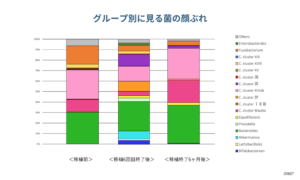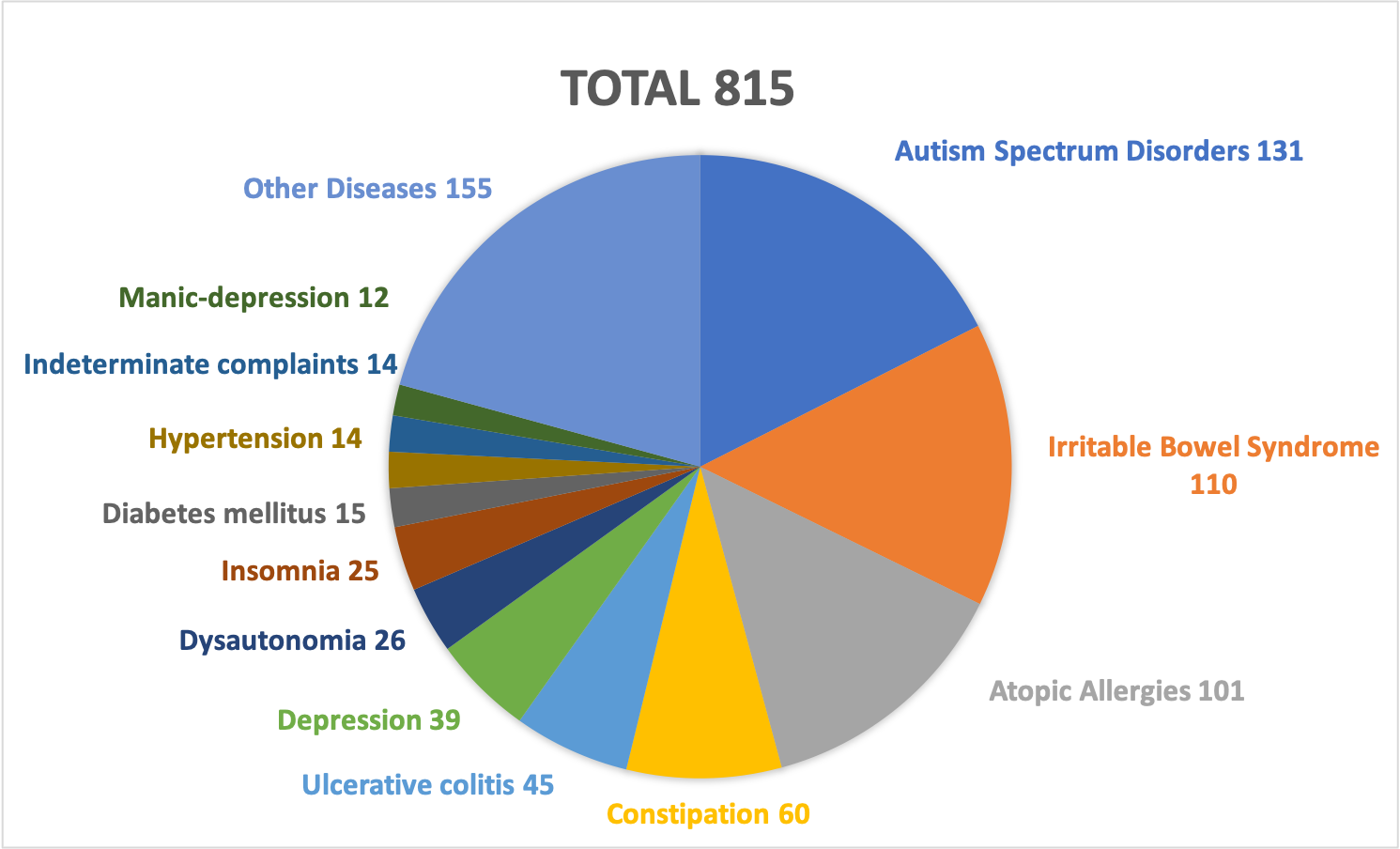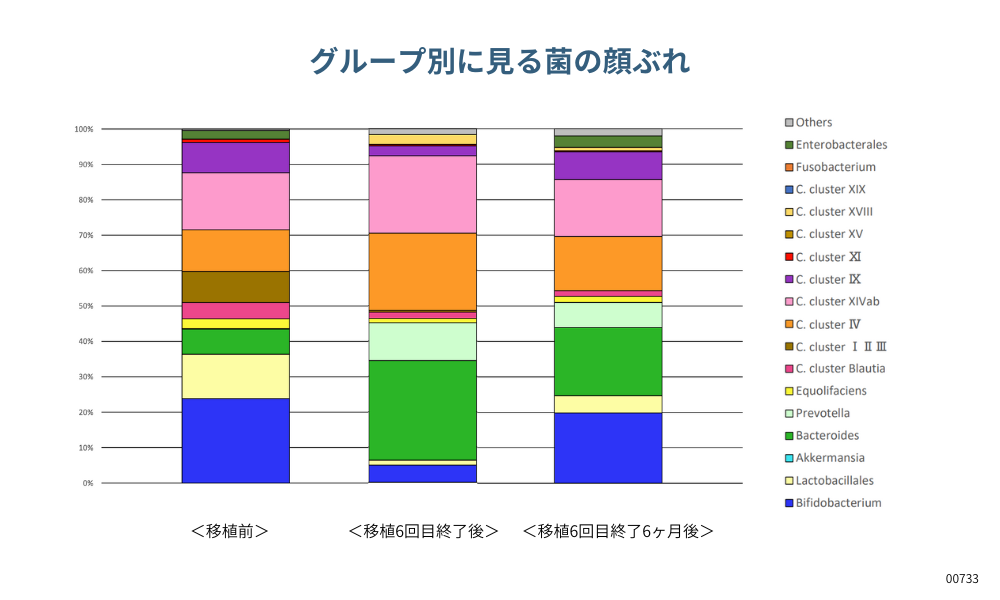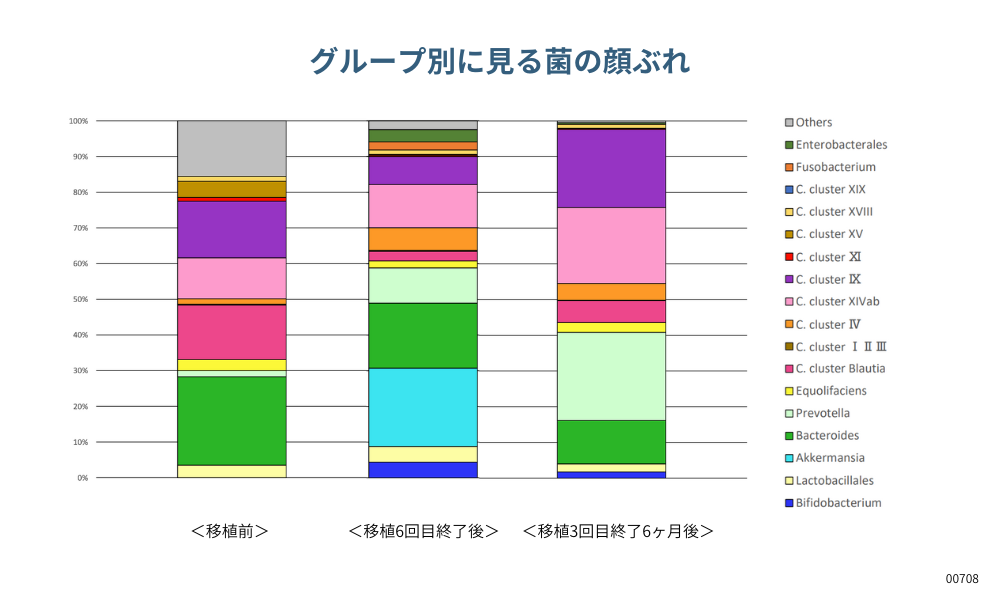Irritable bowel syndrome in a woman in her 50s – Case report of fecal microbiota transplantation
Introduction to cases 50s women Allergic Bowel Syndrome (ABS)
summary
He has muscular dystrophy as an underlying disease, irritable bowel syndrome since his 30s, and has also been diagnosed with SIBO. She avoids wheat because it aggravates her diarrhea. After the first transplant, diarrhea and frequency of bowel movements improved. Because her symptoms became mild, the dosage of drugs for irritable bowel syndrome was reduced, but the soft stools worsened, so the dosage was returned to the previous one. Thereafter, she defecated about once a day, sometimes with soft stools, but the frequency improved with each transplant. She had no abdominal pain and her appetite improved, and her urgency to have a bowel movement and tinnitus also became less severe.
Basic Information
| Patients : | Woman in her 50s |
| Attending physician : | Medical Corporation Keimeikai Kimura Hospital Luke’s Ashiya Clinic |
| Medical institution in charge of transplantation | Medical Corporation Keimeikai Kimura Hospital |
Information at the time of initial medical examination
| Disease name : | irritable bowel syndrome |
| At onset : | |
| Transplant Purpose: To | Improvement of disease, diarrhea |
| Chief complaint : | He began having abdominal pain and diarrhea in the morning before work, which he was able to manage with prescription medications from his local doctor and other medications. She went to a gastroenterologist, and the diarrhea stopped with prescribed medication, but her anxiety became stronger, so she took antidepressants prescribed by a psychiatrist. As soon as she started using an electric wheelchair due to another illness, various symptoms appeared, including swelling, nausea after eating, dizziness, cystitis, and urinary tract stones. He changed his doctor’s office and prescription medication, and the swelling went down, but he often had diarrhea even when taking the medication. She started a diet, which reduced the frequency of diarrhea, but she continued to experience bloating and discomfort in the morning and after meals. At the end of January of this year, she began to have one or two normal stools by taking medication for irritable bowel syndrome and other medications. Gastrointestinal discomfort in the morning and after meals continues. |
| Medical history : | Nothing |
| Background, family history, lifestyle, supplement use, etc : | Vitamins, digestive enzymes, etc. |
Transplant Information
| Transplantation period: from | Oct. 27, 2021~ Nov. 30, 2022 |
| Number of transplants : | 6 transplants |
| Change from first transplant to end of transplant : |
| He had one bowel movement per day, sometimes with soft stools, but the frequency improved with each transplant. She had no abdominal pain, her appetite had improved, her urgency to have a bowel movement and tinnitus had decreased, and the edema in her legs had improved. 【1st transplantation questionnaire】 Banana-like stools in the morning, followed by muddy stools. Continued abdominal discomfort. 【2nd transplantation questionnaire】 The frequency of stools has decreased (about twice). He has also been able to reduce the amount of medication for irritable bowel syndrome. 【3rd transplantation questionnaire】 Appetite has increased. Soft stools are decreasing but still occasional. 【4th transplantation questionnaire】 After reducing the dose of gastrointestinal function regulator, there is diarrhea from soft stools. Soft stools, about 5 stools/day, no abdominal pain. She has a good appetite. 【5th transplantation questionnaire】 Defecation frequency once a day, no soft stools, no abdominal pain. 【6th transplantation questionnaire】 No abdominal pain or soft stools. Urgency to have a bowel movement tends to lessen after the 5th transplant. Muscle weakness in the lower extremities has not changed, but tinnitus has lessened. Edema in the left leg has lessened. 【6th post-transplant 1st medical interview 】 Every morning after waking up, she has a bowel movement. Bloating is not usual, but eating a bit of burdock root has made him a little out of sorts. No progression of muscular dystrophy. No loss of muscle mass. Appetite has increased since transplant. 【2nd interview after 6th transplant】 Stable bowel movements that have been good since the beginning of this month. I am able to eat burdock root and natto. Wheat is also fine in small amounts. No abdominal bloating, but sometimes feels sick after eating three meals. 【3rd interview after 6th transplant】 They are able to eat everything. He is also able to eat vegetables and root vegetables, and is glad to have the transplant. She is able to sleep better, and her mood has improved, as she is not left with bad feelings. I can avoid depression. |
Intestinal flora balance Comparative data

Evaluation and Discussion
| Transplant Evaluation : | Clear improvement of symptoms |
| Adverse events: No | Nothing |
| Transplant Evaluation : |
| He had about one bowel movement per day, sometimes with soft stools, but it improved with each transplant. She had no abdominal pain, her appetite had improved, and her urgency to have a bowel movement had improved. In addition, tinnitus was relieved and edema of the feet improved. Six months after transplantation, the patient’s subjective symptoms (abdominal symptoms) showed improvement, although she was again far from the target balance in the flora test. She was able to eat foods she could not eat before without difficulty. |
… and upwards
その他の Intestinal flora transplantation and case studies に関する記事
Articles about other Intestinal flora transplantation and case studies

April 08, 2024
Fecal microbiota transplantation results〈as of April 1, 2024〉
Fecal microbiota transplantation results by case in our study group (as of April 1, 2024)

April 08, 2024
Fecal microbiota transplantation in a 50-year-old woman with ulcerative colitis
Introduction of cases 50th generation women Ulcerative colitis summary FMT for ulcerative colitis (UC). After starting FMT, he developed appendicitis, which was relieved by antibiotics. Thereafter, he had a temporary exacerbation (hemorrhage), but gradually improved, which was considered effective for UC. Basic Information Patients : Woman in her 50s Attending physician : Luke’s Ashiya Clinic […]

April 08, 2024
Ulcerative colitis (IBS) and small intestinal bacterial growth (SIBO) in a man in his 50s -Case report of fecal microbiota transplantation
Case presentation Male in his 50s with ulcerative colitis (IBS) and small intestinal bacterial growth (SIBO) summary After three transplants, the patient’s symptoms improved slightly, but he is still not satisfied with the results. Basic Information Patients : Male in his 50s Attending physician : Luke’s Ashiya Clinic Medical institution in charge of transplantation : […]





